| |
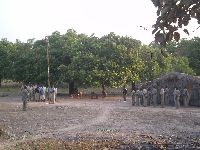 There
isn't anything available for breakfast in Bafilo -- not even an omelet table
-- so we set off straight away
to Kara, There
isn't anything available for breakfast in Bafilo -- not even an omelet table
-- so we set off straight away
to Kara,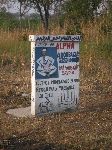 20 km down the road, in search of breakfast. Out
early in the fresh air of the morning, we still didn't beat the students who
were already gathering at the schools in front of the flag pole
for morning assembly. Most primary schools start the day with a flag
raising ceremony, songs and announcements. Several schools and
numerous commercial signs are just a few
of the indicators that the area between Bafilo and Kara is more densely populated
and economically active. Kara is the commercial center of the region.
20 km down the road, in search of breakfast. Out
early in the fresh air of the morning, we still didn't beat the students who
were already gathering at the schools in front of the flag pole
for morning assembly. Most primary schools start the day with a flag
raising ceremony, songs and announcements. Several schools and
numerous commercial signs are just a few
of the indicators that the area between Bafilo and Kara is more densely populated
and economically active. Kara is the commercial center of the region.
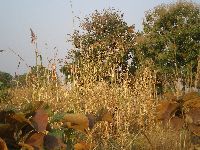
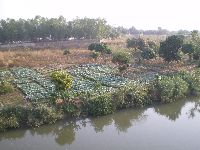 Agriculture
had returned to the landscape as well. The upland farmlands were being used for growing
grain -- sorghum seemed to be the most dominate -- and the river bank was
being used for intensive vegetable cultivation. Agriculture
had returned to the landscape as well. The upland farmlands were being used for growing
grain -- sorghum seemed to be the most dominate -- and the river bank was
being used for intensive vegetable cultivation.
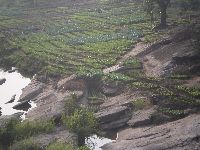
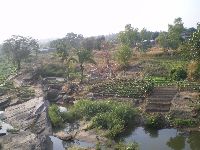
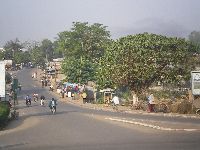 The highway by-passes the town of Kara so we only saw the outskirts.
This seems to be a relatively affluent town, with a lot of cars and motor-cycles
The highway by-passes the town of Kara so we only saw the outskirts.
This seems to be a relatively affluent town, with a lot of cars and motor-cycles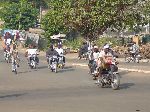 constantly going to and fro. Historically some of Kara's affluence come from
its long association with the Head of State. President Gnassingbé
Eyadéma (1967-2005) was born in Pya, in 1935, a few miles from here, and is
a member of the Kabye ethnic group, which dominates this area. He was
succeeded by his son, Faure, which has helped maintain a connection to the
national coffers.
constantly going to and fro. Historically some of Kara's affluence come from
its long association with the Head of State. President Gnassingbé
Eyadéma (1967-2005) was born in Pya, in 1935, a few miles from here, and is
a member of the Kabye ethnic group, which dominates this area. He was
succeeded by his son, Faure, which has helped maintain a connection to the
national coffers.
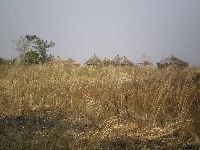 The
Kabye traditionally
made there livelihood primarily through agriculture. The architecture
of their homesteads is typical of a lot of the Sahel; a clusters of round
buildings with clay wall and thatched roofs. The individual building
have specific purposes, like sleeping, cooking, storage, etc. Given the
color of the walls and texture of the roof, hamlets can be totally obscured
when the millet is at its tallest, right before harvest time. The
Kabye traditionally
made there livelihood primarily through agriculture. The architecture
of their homesteads is typical of a lot of the Sahel; a clusters of round
buildings with clay wall and thatched roofs. The individual building
have specific purposes, like sleeping, cooking, storage, etc. Given the
color of the walls and texture of the roof, hamlets can be totally obscured
when the millet is at its tallest, right before harvest time.
Linguistically the people of Sokodé, Bafilo, Kara,
Niamtougou and Kande all speak closely related languages in the Niger-Congo
Volta Area Group family, with origins in present day Ghana.
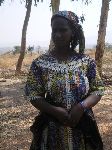 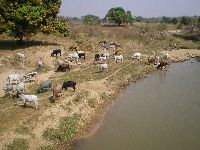 North
of Kara and Pya the climate generally becomes dryer and the population is more
sparse. In this area there are pocket that are primarily ethnically
Fulani (a.k.a. Fulbe, Fula, Peul, Pula or Fulfuldeh). Reserve and
proud are typical adjectives applied to the Fulani. Traditionally they
are a pastoral people that can be found, with their animals, scattered over
a large stretch of the grasslands of North
of Kara and Pya the climate generally becomes dryer and the population is more
sparse. In this area there are pocket that are primarily ethnically
Fulani (a.k.a. Fulbe, Fula, Peul, Pula or Fulfuldeh). Reserve and
proud are typical adjectives applied to the Fulani. Traditionally they
are a pastoral people that can be found, with their animals, scattered over
a large stretch of the grasslands of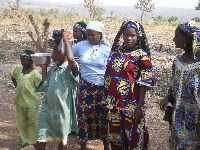 West Africa.
As is traditional with the
West Africa.
As is traditional with the
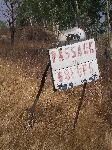 Fulani,
animal husbandry is the main economic activity. The local Fulani here also
prepare cheese, "wagash", that they sell along the roadside. The
cheese is formed into mini-loafs that is about the size of a small hamburger
bun. The cheese itself is firm, creamy white, and the outside of the
loaf is sometimes covered with a red-to-pink substance. Among the
characteristics of Fulani cheese is it doesn't seem to need continuous
refrigeration and, in fact, handles the heat fine. (In other areas the
Fulani make a sun-dried cheese that can look like an irregular shaped
matzo.) Fulani,
animal husbandry is the main economic activity. The local Fulani here also
prepare cheese, "wagash", that they sell along the roadside. The
cheese is formed into mini-loafs that is about the size of a small hamburger
bun. The cheese itself is firm, creamy white, and the outside of the
loaf is sometimes covered with a red-to-pink substance. Among the
characteristics of Fulani cheese is it doesn't seem to need continuous
refrigeration and, in fact, handles the heat fine. (In other areas the
Fulani make a sun-dried cheese that can look like an irregular shaped
matzo.)
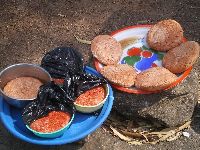
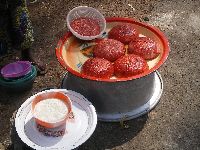
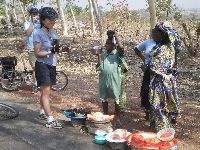
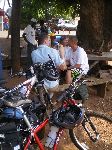 The next town
on our sojourn was Niamtougou. Even at 11 a.m. it was time to take a break, drink, take nourishment and a siesta
in the heat of the day. A great stop in Niamtougou is the Codhani The next town
on our sojourn was Niamtougou. Even at 11 a.m. it was time to take a break, drink, take nourishment and a siesta
in the heat of the day. A great stop in Niamtougou is the Codhani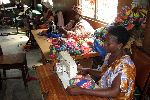 Handicap Cooperative. The center has been operating since 1977. They trains and provides income generating opportunities
for about 55 people with varying degrees of disabilities. They make fabrics items such as clothing,
table cloths, bags, etc. with a variety of colorful patterns.
Handicap Cooperative. The center has been operating since 1977. They trains and provides income generating opportunities
for about 55 people with varying degrees of disabilities. They make fabrics items such as clothing,
table cloths, bags, etc. with a variety of colorful patterns.
Wondering into the neighborhoods of the town was also an
enriching adventure. It is a delightful town, with friendly people and
plenty to tease the eye and mind.
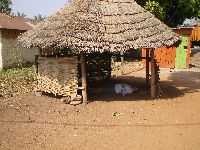
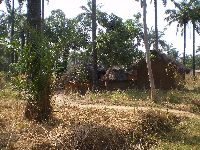
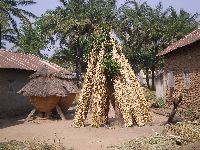
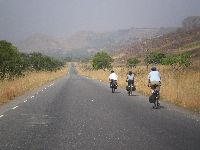
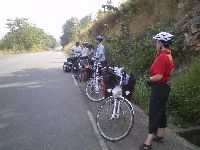 As
you travel further north in Togo there tends to be less woodland, more
grassland and
bigger vistas. The exception can be villages, which tend to have trees
around every house. The combination of afternoon As
you travel further north in Togo there tends to be less woodland, more
grassland and
bigger vistas. The exception can be villages, which tend to have trees
around every house. The combination of afternoon
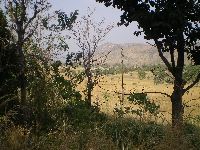 temperature
and lack of shade made afternoon travel more fatiguing. As the sun got
lower in the sky hills along the west side of the road started to cast
shadows that we would pull up into to grab some fresh air, a drink and take in the "classical"
African scenery of grassland savannah with scattered trees and backdrops of
ragged ridgelines. temperature
and lack of shade made afternoon travel more fatiguing. As the sun got
lower in the sky hills along the west side of the road started to cast
shadows that we would pull up into to grab some fresh air, a drink and take in the "classical"
African scenery of grassland savannah with scattered trees and backdrops of
ragged ridgelines.
|
Addendum:
In the waning light of the afternoon, a local band
set-up and practiced for an hour on the patio of the hotel in Kande.
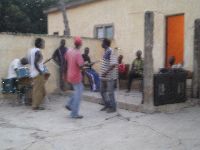
The band members didn't seem to be particularly affected by the heat but
they must have had some concerns about their amplifiers because they were
provided with their own private fans.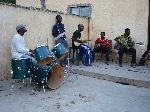
|

























